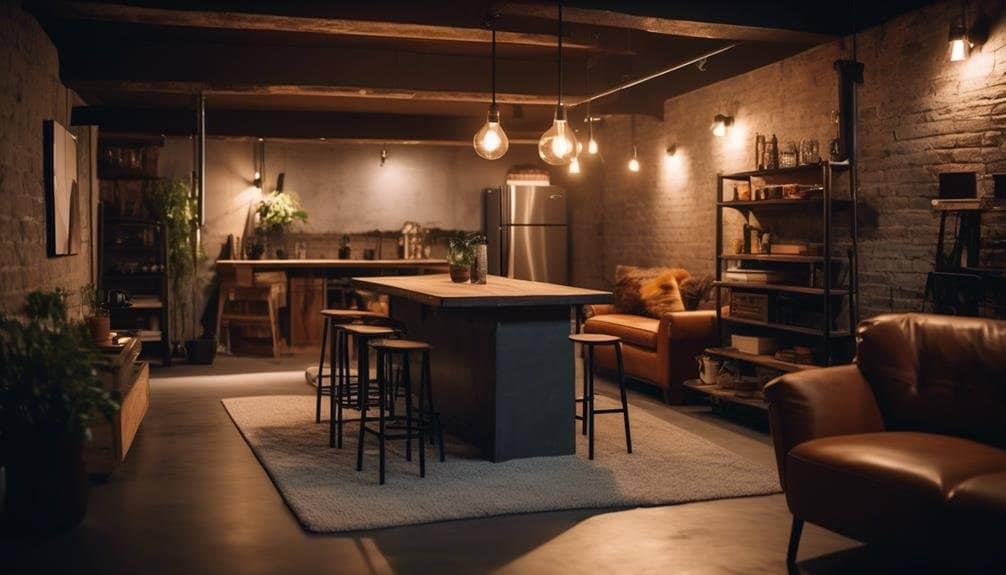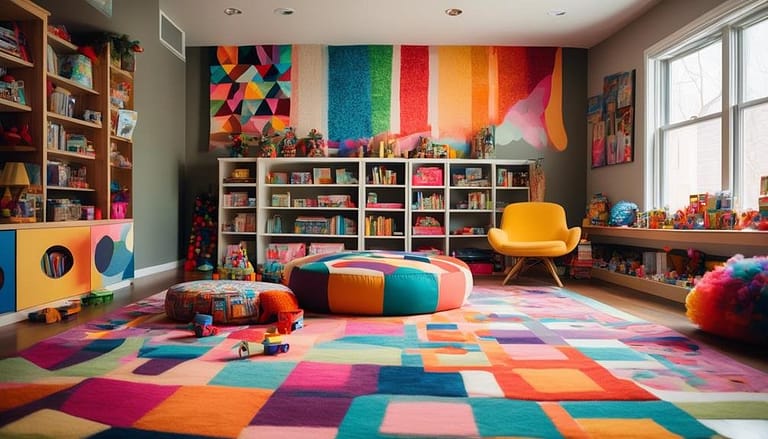Detroit Basement Apartment Conversions
Are you thinking about turning your Detroit basement into a functional and stylish living space? Many homeowners are exploring this trend, and for good reason. Converting an underutilized basement into a valuable living area offers numerous benefits.
However, before you start, it's crucial to consider some key factors that can determine the success of your basement conversion. Let's explore the essential elements that can transform your basement into an attractive living space, adding significant value to your home.
Key Takeaways
Are you considering turning your basement in Detroit into a functional and stylish living space? Many homeowners are exploring this trend for good reasons. Converting an underused basement into a valuable living area offers numerous benefits. Before you start, it's important to consider key factors that can determine the success of your basement conversion. Let's explore the essential elements that can transform your basement into an attractive living space, adding significant value to your home.
To begin, it's crucial to carefully plan the layout and design of the basement space. Consider factors such as natural light, ventilation, and insulation to create a comfortable environment. Additionally, think about incorporating versatile furniture and storage solutions to maximize the functionality of the space.
Furthermore, investing in quality flooring and lighting can significantly enhance the overall look and feel of the basement. Opt for durable and moisture-resistant flooring options, such as vinyl plank or porcelain tile, to mitigate potential water damage. As for lighting, a combination of recessed lighting, floor lamps, and wall sconces can provide adequate illumination and create a welcoming ambiance.
In addition, integrating a well-designed bathroom and kitchenette can further elevate the functionality and convenience of the basement living area. Consider installing modern fixtures, energy-efficient appliances, and ample storage to meet the needs of potential occupants.
Moreover, incorporating thoughtful decor and personal touches can infuse the space with character and warmth. Consider adding area rugs, throw pillows, and wall art to create a cozy and inviting atmosphere. Customizing the space with specific themes or color schemes can also enhance its visual appeal.
Finally, don't overlook the importance of ensuring compliance with local building codes and obtaining necessary permits for the conversion project. Working with experienced contractors and professionals can help navigate these requirements and ensure a smooth and successful transformation.
By carefully considering these essential elements and investing in quality design and construction, you can effectively transform your Detroit basement into a desirable and valuable living space, enhancing the overall appeal and functionality of your home.
Assessing Basement Suitability
Assessing Basement Suitability
Before you start converting a basement into an apartment, it's crucial to thoroughly check the following: the basement's strength, moisture levels, natural light, ventilation, and the possibility of creating a separate entrance.
When checking the strength, make sure the basement can handle the extra space and any changes. Look for signs of water getting in and fix any existing moisture problems to prevent future issues.
Consider the ceiling height and how much natural light comes in to see if the space is livable. It's important to have good ventilation and air flow for a healthy living space, so check the basement's current ventilation system.
Also, see if it's possible to make a separate entrance and check the access points for the basement apartment.
With many things to think about, it's important to carefully look into each aspect before moving forward with the conversion. By thoroughly looking at these elements, you can make sure the basement is right for turning into a comfortable living area.
This assessment is the base for a successful basement apartment conversion, giving you the freedom to create a living space that fits your needs and wishes.
Designing Functional Layouts
When creating layouts for basement conversions, focus on maximizing usable space and meeting the inhabitants' needs by incorporating various living areas.
Consider the floor plan to include smart solutions such as light wells and excavations to bring natural light into the basement, enhancing functionality. By excavating the lower level to increase the ceiling height, a more functional and spacious environment can be created.
Open-plan designs can be used to create a versatile living area that suits various needs. For example, a functional layout for a basement conversion could include:
- A living area with flexible furniture arrangement for various activities
- A kitchen diner for convenience
- A bedroom with ample storage options
- A well-designed bathroom layout with efficient use of space and natural light
This type of layout optimizes the usable space in a basement conversion.
Maximizing Natural Light
Maximizing Natural Light
To make basement conversions more functional and comfortable, it's important to maximize natural light. When converting a basement into a living area in a single-family home, consider adding light wells and excavations to bring in natural light from above. These features not only make the space brighter but also create an open and airy feel. Open-plan designs also help natural light flow throughout the basement, connecting the space to the outdoors.
Using reflective surfaces like glossy floors and light-colored walls can bounce natural light around the space, further brightening the area. Additionally, incorporating windows and skylights is essential for maximizing natural light in the basement. These elements not only bring in sunlight but also provide a connection to the outside world.
When it comes to window treatments, opt for light and sheer options to allow natural light to enter while still maintaining privacy. By implementing these strategies, you can transform a basement into a well-lit, welcoming living space, making it a desirable and comfortable area within your single-family home.
Selecting Durable Materials
When converting your basement, it's important to choose materials that can resist moisture and mold, ensuring they last long and are easy to maintain. Look for materials that can handle water damage and are easy to clean in a basement.
Opt for durable and resistant materials, especially for high-traffic areas in the basement. Select materials suitable for the specific purpose, such as moisture-resistant flooring for a basement kitchen or bathroom.
It's crucial to find materials that balance durability and aesthetics to create a long-lasting and visually appealing basement. Prioritize materials that require minimal upkeep and stand the test of time.
Ensuring Safety and Compliance
Ensuring safety and compliance in basement conversions is vital for protecting occupants from potential hazards. Proper ventilation and egress windows are essential safety features to prevent mold, moisture issues, and provide emergency exits.
When undertaking basement conversions, it's crucial to hire licensed professionals for electrical wiring and insulation to comply with safety regulations and building codes. Compliance with safety regulations also involves addressing fire safety measures and ensuring structural integrity.
Regular inspections and maintenance are vital to ensure ongoing safety and compliance in basement conversions.
To prioritize safety and compliance, ensure that all necessary permits are obtained before beginning the conversion process. Additionally, consider consulting with local building authorities to ensure that your conversion plans adhere to safety regulations and codes.
When it comes to safety, there's no room for compromise. By taking proactive measures to ensure compliance and safety in your basement conversion, you can create a secure and habitable living space for occupants.
Frequently Asked Questions
How Much Does a Basement Conversion Cost?
Converting a basement can cost anywhere from $12,000 to $70,000, depending on factors such as materials and labor. For a more accurate cost estimate, consider hiring a professional contractor to assess the project. This will help you understand the specific requirements and potential costs involved in converting your basement. It's important to have a clear understanding of the overall investment needed for this significant home improvement project. By seeking professional advice, you can make informed decisions and plan your budget effectively.
Do I Need Planning Permission to Convert My Basement?
Before starting your basement conversion, it's important to check with your local authorities to see if you need planning permission. This step is crucial to avoid any potential legal issues and ensure a smooth process. By verifying this, you can proceed with confidence and peace of mind. Remember to adhere to any regulations set by the local authorities to avoid complications down the line. It's always better to be safe than sorry.
Is It Possible to Finish a Michigan Basement?
Certainly, you can renovate a Michigan basement to make it a usable living space. By carefully planning and carrying out renovations, you can transform it into a functional area. Consider the advantages of converting a basement, such as creating extra living space and the potential for different living areas. This can significantly increase the usable space in your home and add value to your property. Additionally, finishing the basement can provide a versatile area for activities such as a home office, entertainment room, or guest accommodations. With the right approach, a Michigan basement can become a valuable and enjoyable part of your home.
Do Basement Conversions Add Value?
Certainly, converting your basement adds value to your home by creating extra living space. This additional space can be utilized for various purposes, ultimately increasing the overall property value and making it more appealing to potential buyers. This is important because it enhances the functionality and desirability of the property. Furthermore, it can significantly improve the overall livability of the home, which is a key consideration for many buyers. Additionally, basement conversions offer the opportunity to create specific areas such as a home office, entertainment space, or guest quarters, adding practical value to the property. It's important to consider these factors when looking to enhance the value of your home.







